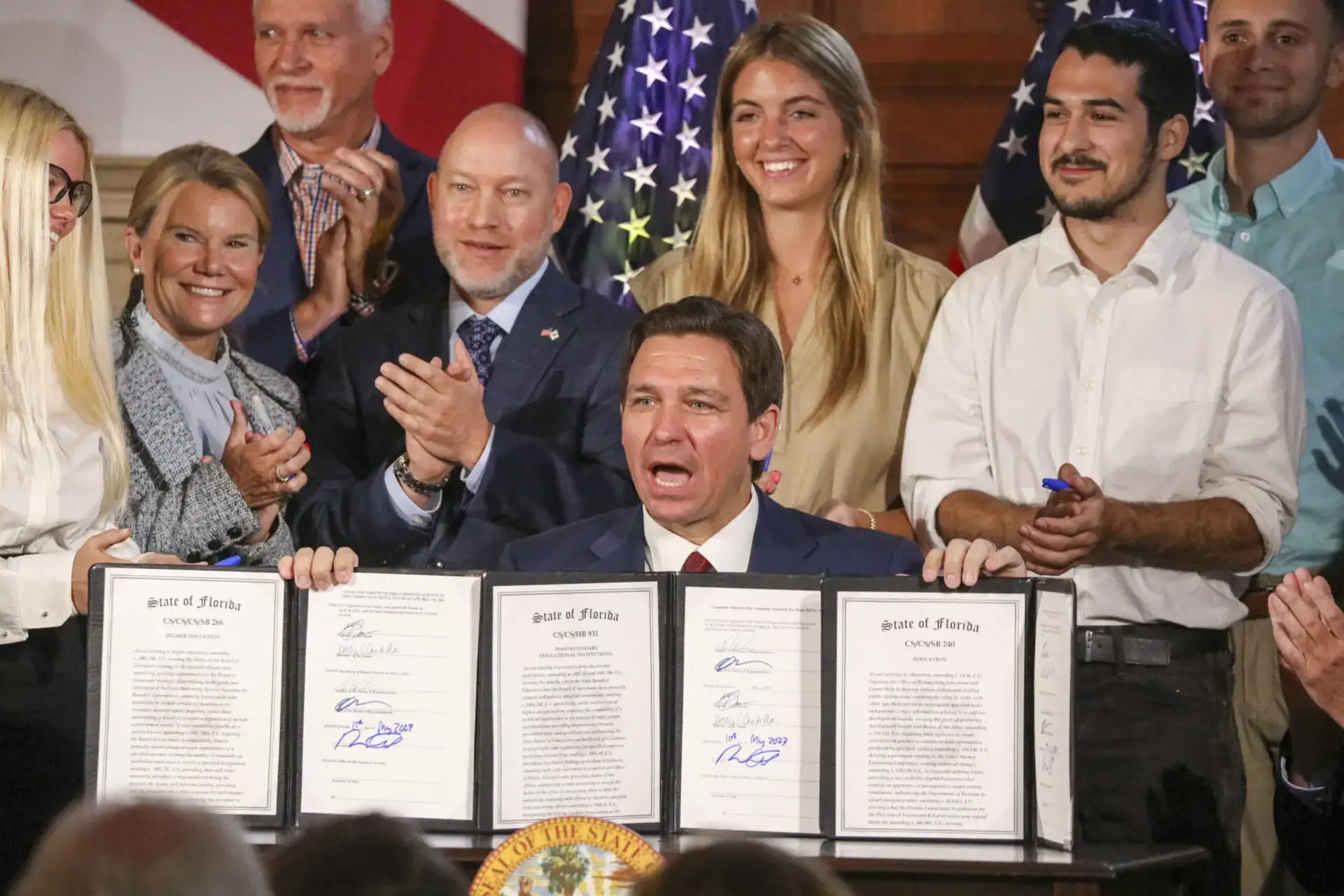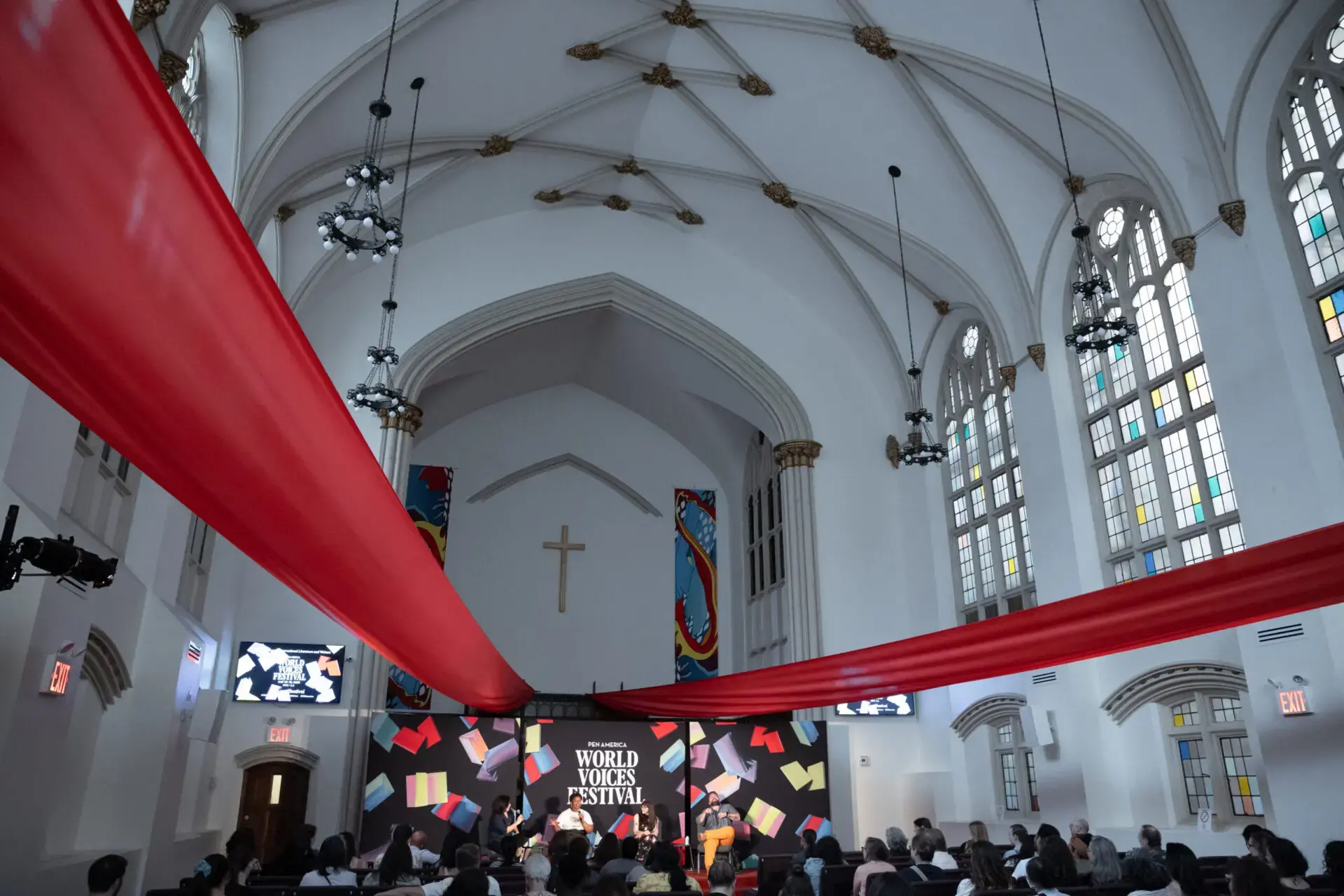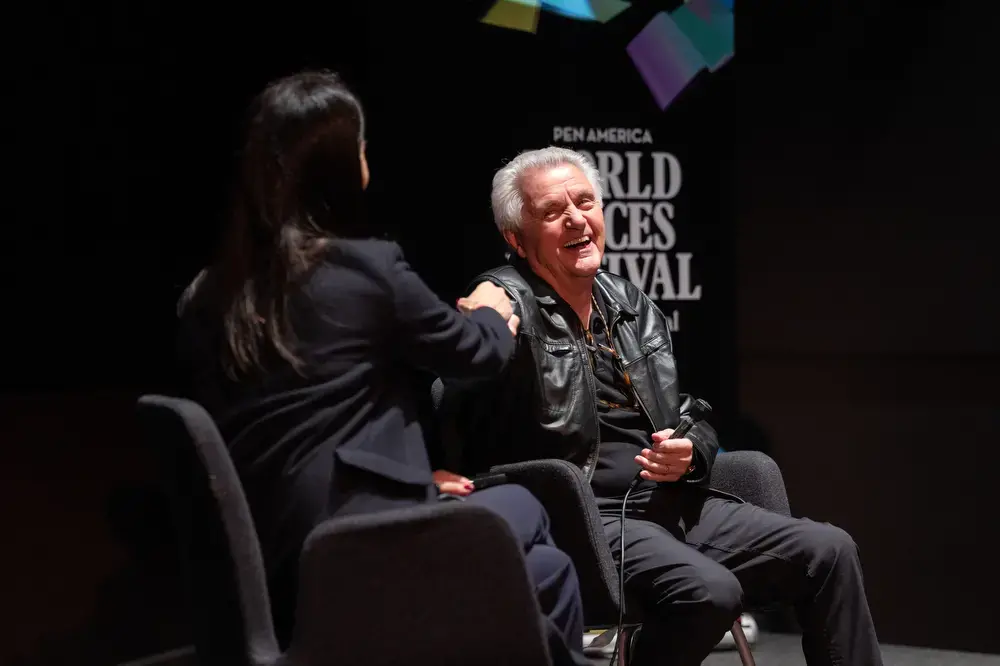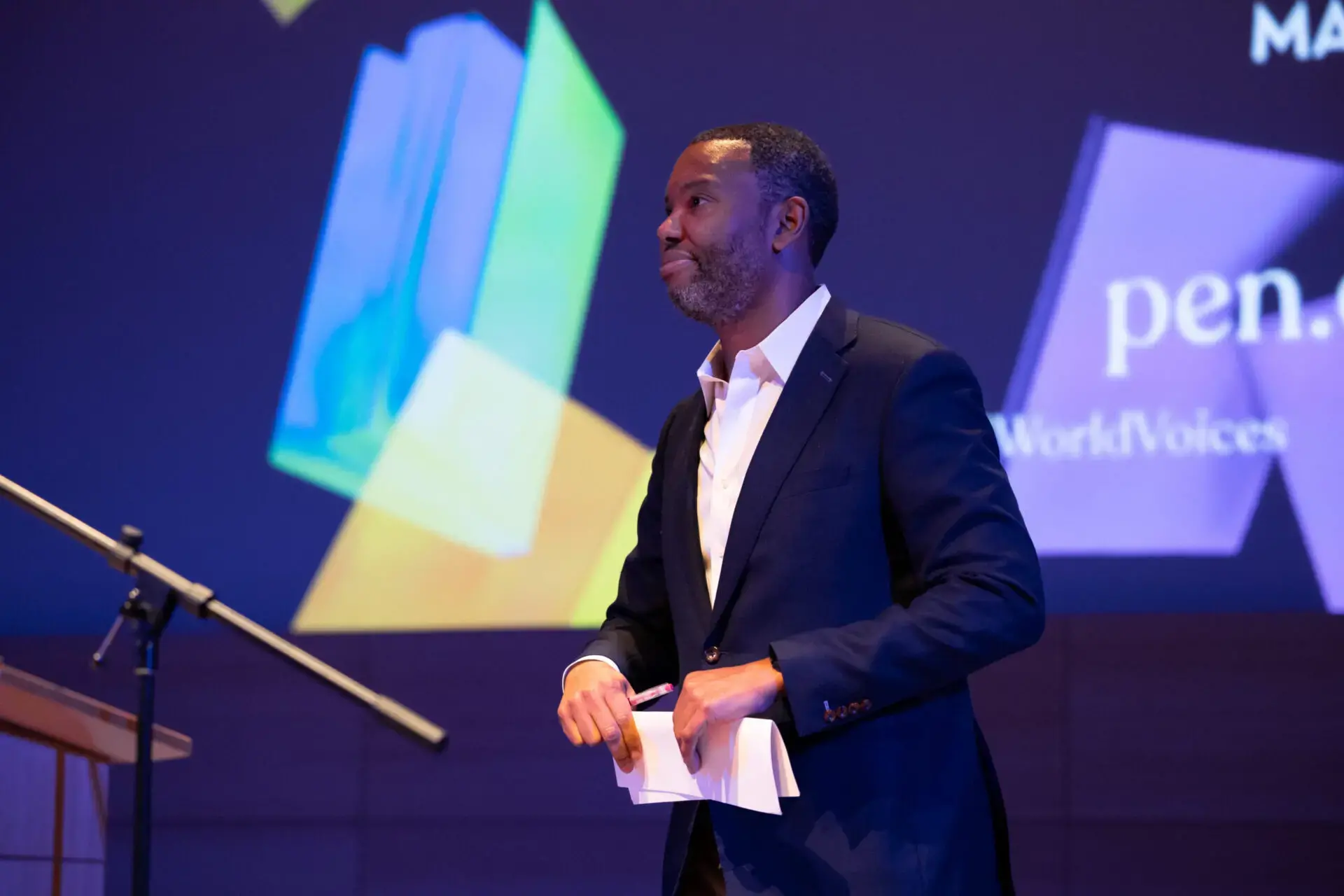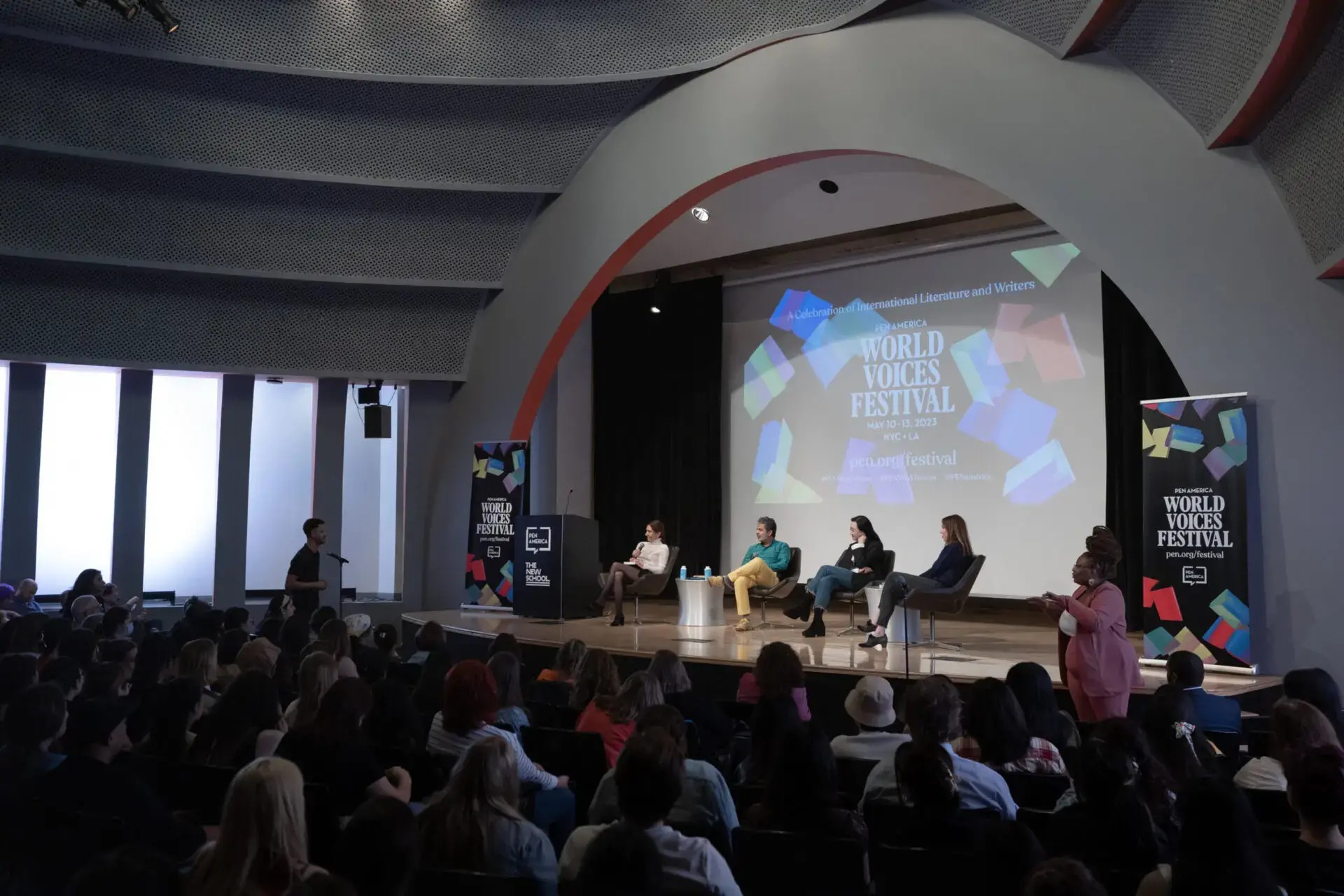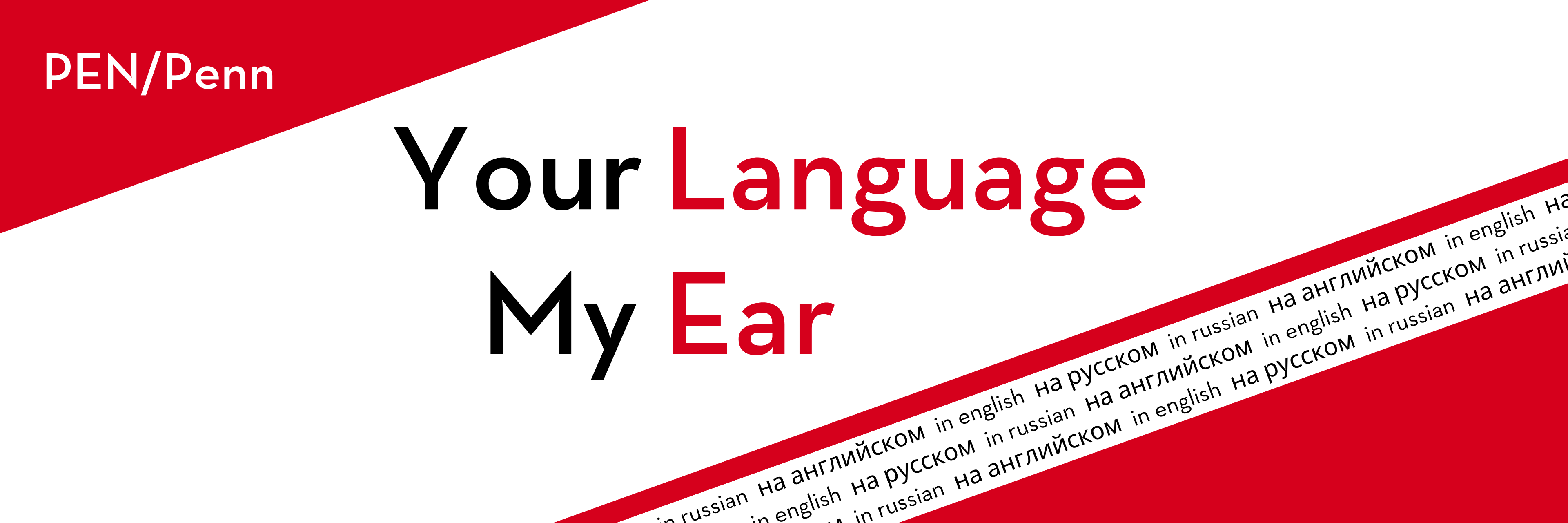 Poets: Egana Dzhabbarova • Igor Gulin • Ruthie Jenrbekova • Maria Malinovskaya • Ramil Niyazov • Dinara Rasuleva • Konstantin Shavlovsky • Evgeniya Suslova • Ekaterina Zakharkiv • Sergey Zavyalov
Poets: Egana Dzhabbarova • Igor Gulin • Ruthie Jenrbekova • Maria Malinovskaya • Ramil Niyazov • Dinara Rasuleva • Konstantin Shavlovsky • Evgeniya Suslova • Ekaterina Zakharkiv • Sergey Zavyalov
Translators: Elina Alter • Catherine Ciepiela • Eugene Ostashvesky • Timmy Straw • Venya Gushchin • Bela Shayevich • Hilah Kohen • D. Brian Kim • Elaine Wilson
Read about Your Language My Ear »
Poets
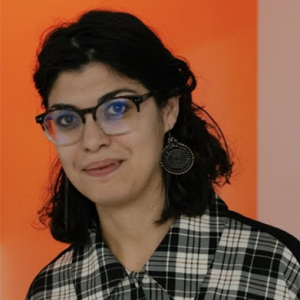 Egana Dzhabbarova (Ekaterinburg, Russia) is a poet and associate professor teaching Russian as a foreign language at the Ural Federal University. She is an organizer of the festival MEZHA and author of the poetry books Bosphorus (2015), Romberg’s Pose (2017), and Red Button Alarm (2020). She is the winner of the 2016 Poetic Debut Award from New Youth magazine. She was also longlisted and shortlisted for the Arkady Dragomoshchenko Award in 2017 and 2019. Her publications have appeared in print and online journals in Russia and Ukraine. Her work is featured in the international anthologies Under One Cover (Kazakhstan) and F-Letter (England). She led a workshop on decolonial writing at Fem Workshop Almaty, supported by the Prince Claus Foundation. Her poems have been translated into English, Polish, German, and Italian.
Egana Dzhabbarova (Ekaterinburg, Russia) is a poet and associate professor teaching Russian as a foreign language at the Ural Federal University. She is an organizer of the festival MEZHA and author of the poetry books Bosphorus (2015), Romberg’s Pose (2017), and Red Button Alarm (2020). She is the winner of the 2016 Poetic Debut Award from New Youth magazine. She was also longlisted and shortlisted for the Arkady Dragomoshchenko Award in 2017 and 2019. Her publications have appeared in print and online journals in Russia and Ukraine. Her work is featured in the international anthologies Under One Cover (Kazakhstan) and F-Letter (England). She led a workshop on decolonial writing at Fem Workshop Almaty, supported by the Prince Claus Foundation. Her poems have been translated into English, Polish, German, and Italian.
 Igor Gulin (Moscow, Russia) is a writer, critic, and essayist based in Moscow. He works as a cultural reviewer for Kommersant-Weekend. He is also the editor and cofounder of the Nosorog literary magazine and is an independent researcher working in the field of late Soviet culture. His poetry, prose, and articles have appeared in NLO, Translit, Textonly, Colta, and more.
Igor Gulin (Moscow, Russia) is a writer, critic, and essayist based in Moscow. He works as a cultural reviewer for Kommersant-Weekend. He is also the editor and cofounder of the Nosorog literary magazine and is an independent researcher working in the field of late Soviet culture. His poetry, prose, and articles have appeared in NLO, Translit, Textonly, Colta, and more.
 Ruthie Jenrbekova (Vienna, Austria) was born in Almaty, Kazakhstan, at the time when it was a Soviet Socialist Republic. She graduated from Kazakh State University as an ecologist. Since 1997, she has been involved in various literary, artistic, and curatorial activities. She also works as an interdisciplinary artist/researcher and cultural organizer. Together with Maria Vilkovisky, she is the cofounder of the imaginary art institution krёlex zentre. She writes texts as both theory and poetry. Her fields of interest include performance philosophy, material semiotics, and art-based methodologies. Currently a Ph.D. candidate at the Academy of Fine Arts Vienna, she lives and works in Almaty and Vienna.
Ruthie Jenrbekova (Vienna, Austria) was born in Almaty, Kazakhstan, at the time when it was a Soviet Socialist Republic. She graduated from Kazakh State University as an ecologist. Since 1997, she has been involved in various literary, artistic, and curatorial activities. She also works as an interdisciplinary artist/researcher and cultural organizer. Together with Maria Vilkovisky, she is the cofounder of the imaginary art institution krёlex zentre. She writes texts as both theory and poetry. Her fields of interest include performance philosophy, material semiotics, and art-based methodologies. Currently a Ph.D. candidate at the Academy of Fine Arts Vienna, she lives and works in Almaty and Vienna.
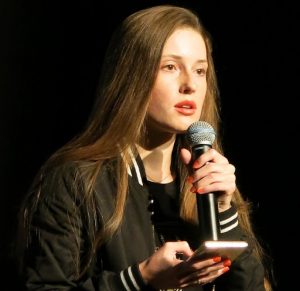 Maria Malinovskaya is a poet, translator, and founder and editor-in-chief of RADAR international poetry magazine. She is an author of two books: a documentary poetry project and collection Kaimaniya (2020), based on the speech of people suffering from mental disorders, and The Movement of Hidden Colonies (2020). Malinovskaya’s poetry has been published in numerous anthologies and magazines and translated into many languages. Malinovskaya’s poem, “white-red-white flag,” based on the events relating to the Belarusian protests of 2020, won one of the main awards for poetry written in Russian language, the Poesia Prize (2021).
Maria Malinovskaya is a poet, translator, and founder and editor-in-chief of RADAR international poetry magazine. She is an author of two books: a documentary poetry project and collection Kaimaniya (2020), based on the speech of people suffering from mental disorders, and The Movement of Hidden Colonies (2020). Malinovskaya’s poetry has been published in numerous anthologies and magazines and translated into many languages. Malinovskaya’s poem, “white-red-white flag,” based on the events relating to the Belarusian protests of 2020, won one of the main awards for poetry written in Russian language, the Poesia Prize (2021).
 Ramil Niyazov (St. Petersburg, Russia & Almaty, Kazakhstan) is a post-Soviet Uyghur and/or Kazakh of Uyghur origin. He writes poetry, as well as studies contemporary art, post-colonial studies, queer sufism, and the steppe. He is originally from Almaty, but studies at St. Petersburg State University in the Faculty of Liberal Arts and Sciences. He is also a member of krёlex zentre and editor of полутона.
Ramil Niyazov (St. Petersburg, Russia & Almaty, Kazakhstan) is a post-Soviet Uyghur and/or Kazakh of Uyghur origin. He writes poetry, as well as studies contemporary art, post-colonial studies, queer sufism, and the steppe. He is originally from Almaty, but studies at St. Petersburg State University in the Faculty of Liberal Arts and Sciences. He is also a member of krёlex zentre and editor of полутона.
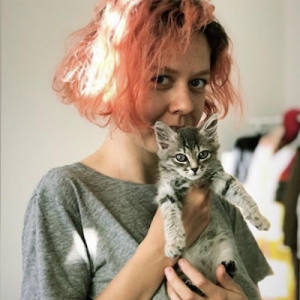 Dinara Rasuleva (Berlin, Germany) is a poetess based in Berlin and born in Kazan, Tatarstan, Russia toward the end of ’80s. For the first six years of her life, Rasuleva spoke only her native Tatar language and now she writes predominantly in Russian, mixing it with Tatar, English, and German—languages she used everyday in Berlin. In Berlin, she started in poetry slams, became a winner twice, started organizing slams and festivals herself. She travels around the world performing mostly for Russian-speaking immigrants. Her poetry was described and analyzed as decolonial and feminist writing, as well as expressionist poetry and performance poetry.
Dinara Rasuleva (Berlin, Germany) is a poetess based in Berlin and born in Kazan, Tatarstan, Russia toward the end of ’80s. For the first six years of her life, Rasuleva spoke only her native Tatar language and now she writes predominantly in Russian, mixing it with Tatar, English, and German—languages she used everyday in Berlin. In Berlin, she started in poetry slams, became a winner twice, started organizing slams and festivals herself. She travels around the world performing mostly for Russian-speaking immigrants. Her poetry was described and analyzed as decolonial and feminist writing, as well as expressionist poetry and performance poetry.
 Konstantin Shavlovsky: Poet, cinema critic, publisher, curator. Creator and executive manager of the intellectual literature bookshop Word Order (Saint Petersburg). As a cinema critic, worked in the editorial office of Seance magazine (2004-2017). Published many books about the history of Russian cinema. As an independent curator, realized several interdisciplinary projects dedicated to the cinema. As a poet, was published in literature magazines New Literary Review, TextOnly, Translit, a collection of queer poetry Under One Cover, etc. Author of two books of poetry: Twins In Nettles (Kolonna Publications, 2015) and What should have been told from the very beginning (New Literary Review, 2021).
Konstantin Shavlovsky: Poet, cinema critic, publisher, curator. Creator and executive manager of the intellectual literature bookshop Word Order (Saint Petersburg). As a cinema critic, worked in the editorial office of Seance magazine (2004-2017). Published many books about the history of Russian cinema. As an independent curator, realized several interdisciplinary projects dedicated to the cinema. As a poet, was published in literature magazines New Literary Review, TextOnly, Translit, a collection of queer poetry Under One Cover, etc. Author of two books of poetry: Twins In Nettles (Kolonna Publications, 2015) and What should have been told from the very beginning (New Literary Review, 2021).
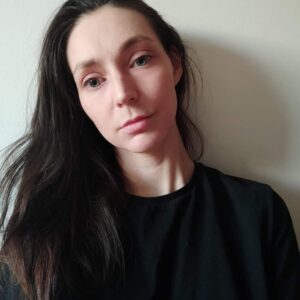 Evgeniya Suslova is a poet and artist. In her practice, she works with the principles of strange communication, making the language space of a thought experiment. Author of poetry books «Свод масштаба» (2013) and «Животное» (2016). Co-founder of publishing house-laboratory “Red Swallow.” Candidate of philological sciences, preparing a dissertation devoted to the study of the language of contemporary poetry. As a researcher, Suslova is developing a theory of poetic connection and writes on language in a media-analytical dimension. Published in «Новое литературное обозрение», «Транслит», «Цирк Олимп», «Соло неба», «Греза» and others. Poetic texts translated into French, German, Spanish, Greek, and Azerbaijani. Graduated from the Rodchenko School of Photography and Multimedia (class: Interactive, communicative and mixed media). As an artist she has done interactive installations and performance art. Artistic works have been displayed in the Vadim Sidur Museum, the Garage museum of contemporary art, the New Space at the Theater of nations, the Bauhaus Dessau Museum, and other venues. She teaches writing at the Rodchenko School, the Moscow School for New Literature, and the British Higher School of Design, and teaches a range of liberal arts courses at Lobachevsky State University of Nizhniy Novgorod National Research University.
Evgeniya Suslova is a poet and artist. In her practice, she works with the principles of strange communication, making the language space of a thought experiment. Author of poetry books «Свод масштаба» (2013) and «Животное» (2016). Co-founder of publishing house-laboratory “Red Swallow.” Candidate of philological sciences, preparing a dissertation devoted to the study of the language of contemporary poetry. As a researcher, Suslova is developing a theory of poetic connection and writes on language in a media-analytical dimension. Published in «Новое литературное обозрение», «Транслит», «Цирк Олимп», «Соло неба», «Греза» and others. Poetic texts translated into French, German, Spanish, Greek, and Azerbaijani. Graduated from the Rodchenko School of Photography and Multimedia (class: Interactive, communicative and mixed media). As an artist she has done interactive installations and performance art. Artistic works have been displayed in the Vadim Sidur Museum, the Garage museum of contemporary art, the New Space at the Theater of nations, the Bauhaus Dessau Museum, and other venues. She teaches writing at the Rodchenko School, the Moscow School for New Literature, and the British Higher School of Design, and teaches a range of liberal arts courses at Lobachevsky State University of Nizhniy Novgorod National Research University.
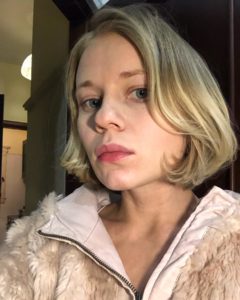 Ekaterina Zakharkiv (Moscow, Russia) is a literary and production editor for F-writing – a platform that publishes texts that engage, problematize or analyze the queer and feminist logic of writing – Syg.ma – a (micro)media platform for contemporary poetry – and GRYOZA. She is the co-founder and Chief Editor of the Almanac Fire, a network portal to the possible worlds of poetry, sound and image. She is also a researcher of modern poetry, a translator, graduate student and junior researcher of the Institute of Linguistics of the Russian Academy of Sciences. Her poems have been translated into English, Spanish, Polish, Latvian and Chinese, and have been published in the magazines NLO, Zerkalo, Nosorog, F-writing, Lana Turner, Punctum and others. She is a laureate of the Arkady Dragomoshchenko Prize (2016), and the author of the book Felicity Conditions (M.: ARGO-RISK, 2017). Her academic articles are devoted to the study of the linguo-pragmatic aspect of modern poetic discourse (magazines Matica srpska, Slovo.ru, NLO, etc.). She has translated the work of anglophone poets such as J. Graham, B. Watten, C. Harryman, and R. Clervaux.
Ekaterina Zakharkiv (Moscow, Russia) is a literary and production editor for F-writing – a platform that publishes texts that engage, problematize or analyze the queer and feminist logic of writing – Syg.ma – a (micro)media platform for contemporary poetry – and GRYOZA. She is the co-founder and Chief Editor of the Almanac Fire, a network portal to the possible worlds of poetry, sound and image. She is also a researcher of modern poetry, a translator, graduate student and junior researcher of the Institute of Linguistics of the Russian Academy of Sciences. Her poems have been translated into English, Spanish, Polish, Latvian and Chinese, and have been published in the magazines NLO, Zerkalo, Nosorog, F-writing, Lana Turner, Punctum and others. She is a laureate of the Arkady Dragomoshchenko Prize (2016), and the author of the book Felicity Conditions (M.: ARGO-RISK, 2017). Her academic articles are devoted to the study of the linguo-pragmatic aspect of modern poetic discourse (magazines Matica srpska, Slovo.ru, NLO, etc.). She has translated the work of anglophone poets such as J. Graham, B. Watten, C. Harryman, and R. Clervaux.

Born in 1958 in Tsarskoye Selo/Pushkin, Leningrad region, Sergey Zavyalov graduated from the Department of Classical Philology at Leningrad University. He was a member of Club 81, an oppositional writers’ organisation in the 1980s, and was published in the magazines of the Leningrad Samizdat. In the 1990s, he taught Latin, Ancient Greek and Classical literature at St. Petersburg universities and gave special courses on the history of unofficial literature at the university. Between 2004 and 2011 he lived in Finland, and from 2011 onwards he has lived in Switzerland, where he gives lecture courses on the history of Soviet poetry at the University of Zurich. He is the author of seven poetry books in Russian, most recently Стихотворения и поэмы 1993-2017. Москва, Новое литературное обозрение (Collected Poems 1993-2017). Moscow: New Literary Observer published several books of essays and has nine books translated into foreign languages. He is the winner of the Andrey Bely Prize (2015) and Premio Ceppo Internazionale Piero Bigongiari (2016).
Translators
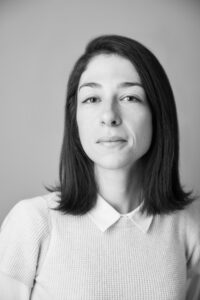 Elina Alter is a writer and translator. Her translation of Alla Gorbunova’s It’s the End of the World, My Love (Deep Vellum) was published in February 2023, and another collection is forthcoming. Her translation of Oksana Vasyakina’s Wound (Catapult US, MacLehose UK) will be published in September 2023. She is an Oral History Fellow at the Yiddish Book Center and the editor of Circumference, a magazine of translation and international culture.
Elina Alter is a writer and translator. Her translation of Alla Gorbunova’s It’s the End of the World, My Love (Deep Vellum) was published in February 2023, and another collection is forthcoming. Her translation of Oksana Vasyakina’s Wound (Catapult US, MacLehose UK) will be published in September 2023. She is an Oral History Fellow at the Yiddish Book Center and the editor of Circumference, a magazine of translation and international culture.

Catherine Ciepiela studies and translates Russian literature. She co-edited, with Honor Moore, The Stray Dog Cabaret, an anthology of poems by the Russian modernists, and edited the anthology Relocations, featuring three contemporary Russian women poets. Her translations have appeared in The Nation, The Massachusetts Review, Seneca Review, and elsewhere. She recently published her translation of Polina Barskova’s prose, Living Pictures, with NYRB.
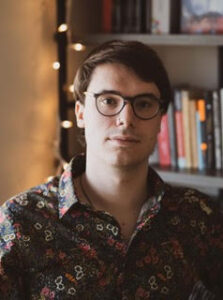 Venya Gushchin is a PhD Candidate at Columbia University, writing a dissertation on the late styles of Russian Modernist poets. He is also a translator, primarily working on Silver Age poetry (Anna Akhmatova, Vladimir Mayakovsky, Aleksandr Blok among others). His translations of Vladimir Mayakovsky and Elizaveta Mnatasakanova have received the Columbia University Slavic Department Pushkin Prize. Blockade Swallow, selected poems by Olga Berggolts translated by Gushchin, appeared from Smokestack Books in 2022. Most recently, his translation of Yevsey Tseytlin’s Rereading Silence was published by Bagriy & Company. His writing has appeared in Full Stop, Jacket2, Cardinal Points, and elsewhere.
Venya Gushchin is a PhD Candidate at Columbia University, writing a dissertation on the late styles of Russian Modernist poets. He is also a translator, primarily working on Silver Age poetry (Anna Akhmatova, Vladimir Mayakovsky, Aleksandr Blok among others). His translations of Vladimir Mayakovsky and Elizaveta Mnatasakanova have received the Columbia University Slavic Department Pushkin Prize. Blockade Swallow, selected poems by Olga Berggolts translated by Gushchin, appeared from Smokestack Books in 2022. Most recently, his translation of Yevsey Tseytlin’s Rereading Silence was published by Bagriy & Company. His writing has appeared in Full Stop, Jacket2, Cardinal Points, and elsewhere.
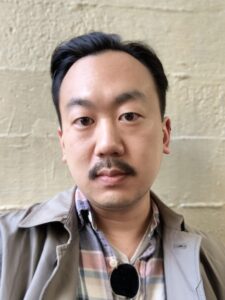 D. Brian Kim (Philadelphia, United States) is Assistant Professor of Russian and East European Studies at the University of Pennsylvania. His main scholarly interests are Russian literature, cultural exchange, and the theory and practice of translation. His work as a translator from Russian into English spans poetry, literary criticism and theory, and academic writing in various humanistic fields. Current projects include a scholarly book about foreign languages, translation, and the concept of the universal in Russian thought during the late imperial period, as well as a co-edited volume of translations of early twentieth-century writings about Fyodor Dostoevsky and Lev Tolstoy.
D. Brian Kim (Philadelphia, United States) is Assistant Professor of Russian and East European Studies at the University of Pennsylvania. His main scholarly interests are Russian literature, cultural exchange, and the theory and practice of translation. His work as a translator from Russian into English spans poetry, literary criticism and theory, and academic writing in various humanistic fields. Current projects include a scholarly book about foreign languages, translation, and the concept of the universal in Russian thought during the late imperial period, as well as a co-edited volume of translations of early twentieth-century writings about Fyodor Dostoevsky and Lev Tolstoy.

Hilah Kohen is a translator and a doctoral student at the University of Pennsylvania. Their collaborations in Juhuri (Kavkazi Jewish) language advocacy include curatorial work for the Jewish Language Project and a collective article about teaching and learning languages that face suppression in the Russian Federation (Russian Language Journal 71.3). Their translations of literature and journalism have focused on climate politics in Russia and on creative responses to Soviet colonialism. This work has appeared in venues like Gulf Coast, The Los Angeles Review of Books, and the “Russophonia” issue of Words Without Borders, which Hilah co-edited with Josephine von Zitzewitz. Hilah’s research aims to bolster their community and literary efforts. It approaches Modern Turkish, Modern Hebrew, and similarly reconstructed languages of the Soviet Union as a related set of nation-building projects, asking how these violent “language revolutions” of the early twentieth century continue to shape language access today.

Eugene Ostashvesky was born in 1968 in Leningrad, USSR, grew up in New York, and now lives mainly in Berlin. His Feeling Sonnets, published in 2022 by Carcanet in the UK and NYRB Poets in the US, examine the effects of speaking a non-native language on emotions, parenting, and identity. An earlier book, The Pirate Who Does Not Know the Value of Pi (NYRB Poets, 2017), discusses communication difficulties between pirates and parrots. Its German translation by Uljana Wolf and Monika Rink won the City of Münster International Poetry Prize. It was also the pretext of a mini-opera by Lucia Ronchetti at the 2019 Venice Biennale. His other books of poetry, The Life and Opinions of DJ Spinoza and Iterature, were published by Ugly Duckling Presse in 2008 and 2005. As translator Russian avantgarde literature, Ostashevsky is best known for his OBERIU: An Anthology of Russian Absurdism (Northwestern UP, 2006) and Alexander Vvedensky’s An Invitation for Me to Think (with Matvei Yankelevich; NYRB Poets, 2013), which won the National Translation Award. His translations of contemporary Russophone writing include F Letter: New Russian Feminist Poetry (co-edited with Ainsley Morse and Galina Rymbu; isolarii, 2020) and Lucky Breaks by Yevgenia Belorusets (New Directions, 2022).
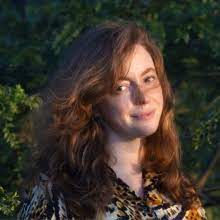 Bela Shayevich is a Soviet-American writer, translator, and visual artist. Her work has appeared in Harper’s, The New Yorker, The Guardian, and n+1 among other publications. Her translation of Elena Kostyuchenko’s I Love Russia, co-translated with Ilona Yabzhin Chavasse, is forthcoming in October 2023 from Penguin Press.
Bela Shayevich is a Soviet-American writer, translator, and visual artist. Her work has appeared in Harper’s, The New Yorker, The Guardian, and n+1 among other publications. Her translation of Elena Kostyuchenko’s I Love Russia, co-translated with Ilona Yabzhin Chavasse, is forthcoming in October 2023 from Penguin Press.
 Timmy Straw is a poet and translator from Oregon. Their work has been supported by fellowships from the Iowa Writers’ Workshop, the Fulbright program, and the Kone Foundation, and their poems appear in Annulet, The Paris Review, Yale Review and elsewhere. Their first book, The Thomas Salto, comes out on Fonograf Editions in fall 2023, and they’re working with Ainsley Morse on a collection of translations of the Russian poet Grigori Dashevsky. They study comparative literature at the University of Pennsylvania.
Timmy Straw is a poet and translator from Oregon. Their work has been supported by fellowships from the Iowa Writers’ Workshop, the Fulbright program, and the Kone Foundation, and their poems appear in Annulet, The Paris Review, Yale Review and elsewhere. Their first book, The Thomas Salto, comes out on Fonograf Editions in fall 2023, and they’re working with Ainsley Morse on a collection of translations of the Russian poet Grigori Dashevsky. They study comparative literature at the University of Pennsylvania.
 Elaine Wilson is a literary translator and PhD candidate in the Department of Slavic Languages at Columbia University. She studies Russian and Yiddish literature of the early Soviet period and is currently at work on her dissertation, entitled: “The Soviet Exodic: Resistance and Revolution in Soviet Russian and Yiddish Literature, 1917 – 1935.” She lives in New York City.
Elaine Wilson is a literary translator and PhD candidate in the Department of Slavic Languages at Columbia University. She studies Russian and Yiddish literature of the early Soviet period and is currently at work on her dissertation, entitled: “The Soviet Exodic: Resistance and Revolution in Soviet Russian and Yiddish Literature, 1917 – 1935.” She lives in New York City.
Jump to: Read about Your Language My Ear | Meet the 2023 Participants | Meet the 2022 Participants (top) | Meet the Expert Group
